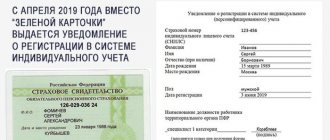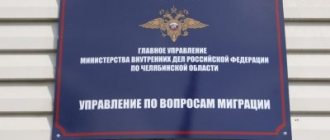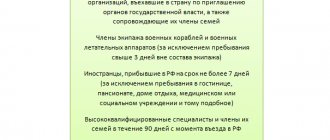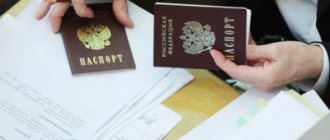In modern economic realities, many companies and individuals in Russia resort to using the labor of foreign workers to organize their activities. However, the attraction of foreign labor, from the point of view of the registration process and further maintenance of records of foreign personnel, differs significantly from the rules for the registration of citizens of the Russian Federation and is regulated by special labor and migration legislation, violation of which leads to a fine for attracting foreign labor.
We will consider in detail the most common cases of violation of migration and labor laws by the employer and fines to the employer for illegal immigrants and foreigners in our article.
Let's hope that this information will allow employers to avoid fines for hiring foreigners to work in the organization.
To move around the page more conveniently, you can use the navigation:
- The most common fines for an employer for a foreigner and the amount of fines
- Fines for employers for violating immigration laws
- Fines to the employer for violation of labor laws
- Fines to the employer for violation of labor protection conditions
- How to find out if an employer has fines for foreign workers
Fines for illegally hiring a foreigner to work
Violations related to the illegal recruitment of foreigners to work are punishable by fines under Parts 1 and 2 of Art. 18.15 Code of Administrative Offenses of the Russian Federation:
| Violation | Fines, rub. | ||
| For citizens | On officials | For legal entities | |
| Involving a foreigner in labor activities in the absence of a work permit or patent, if required by law, as well as engaging in a profession not specified in the permit or patent, without obtaining special permission, if required by law | From 2,000 to 5,000 rubles. | From 25,000 to 50,000 rubles. | From 250,000 to 800,000 rubles. or suspension of activities for a period of 14 to 90 days |
| Failure to notify or violation of the established procedure and/or form of notification to the migration authority about the conclusion or termination of an employment contract or civil service contract with a foreigner within a period not exceeding 3 working days from the date of conclusion or termination of the contract, if such notification is required by law | From 2,000 to 5,000 rubles. | From 35,000 to 50,000 rubles. | From 400,000 to 800,000 rubles. or suspension of activities for a period of 14 to 90 days |
If the above violations were committed in Moscow or St. Petersburg or in the Moscow or Leningrad region, increased fines are applied (Part 4 of Article 18.15 of the Code of Administrative Offenses of the Russian Federation):
- for citizens: from 5,000 to 7,000 rubles;
- for officials: from 35,000 to 70,000 rubles;
- for companies: from 400,000 to 1,000,000 rubles. or suspension of activities for a period of 14 to 90 days.
The employer will pay a fine in the specified amount for violations committed against each foreigner individually.
As judicial practice shows, under Part 4 of Art. 18.15 of the Code of Administrative Offenses of the Russian Federation, a fine for illegal contractors can be imposed on the general contractor - it was he who allowed them to work without checking the legality of attracting foreign labor at the construction site (Resolution of the AS SZZ dated 09/04/2018 in case No. A56-65169/2017).
But if they are trying to punish you for not informing the migration authority about a change in the foreigner’s labor function (for example, transferring him from driver to salesperson), then such a fine will be illegal. The Supreme Court of the Russian Federation, in Resolution No. 31-AD20-3 dated September 18, 2020, recalled that the employer does not need to notify the Ministry of Internal Affairs about a change in the position, work address and other working conditions of a foreigner until the employment contract with him is terminated.
The fine for illegally recruiting a foreigner to work does not apply if the employee was not actually allowed to work (Note 1 to Article 18.15 of the Code of Administrative Offenses of the Russian Federation, paragraph 20 of the Resolution of the Plenum of the Supreme Arbitration Court of the Russian Federation dated February 17, 2011 No. 11).
Is it possible to mitigate or reduce the punishment?
The fact of employment without a patent is a violation of labor and migration laws on the part of both the employer and the employee. If the law requires a preventive measure - deportation from the country, then the court can take into account such mitigating circumstances as the residence of close relatives in the Russian Federation (children, spouses, parents, adoptive parents, grandparents, grandchildren, sisters, brothers) and choose a more mild punishment.
Mitigation of punishment for employers is provided for in Article 112 of the Tax Code of the Russian Federation if the offense is committed under the following circumstances:
- due to particularly difficult family or personal circumstances;
- due to the official, financial or other dependence of the offender;
- under duress or threat;
- difficult financial situation.
We discussed the specifics of hiring foreigners with a patent, as well as information about taxes and the cost of a patent in our other articles.
Fines for violations in the payment of salaries to HQS
In Art. 13.2 of Law No. 115-FZ specifies the salaries of foreigners-HQS, below which the employer has no right to pay. If an employer pays wages to foreign HQSs in violation of legal requirements, he may face:
- fines in the amount of up to 50,000 rubles, per company, up to 20,000 rubles. against the manager, if the fact of paying under-salaries to foreigners-HQS is revealed during an inspection by the labor inspectorate (Part 6 of Article 5.27 of the Code of Administrative Offenses of the Russian Federation);
- criminal liability of a manager for non-payment of wages to a foreigner-HQS for more than 3 months (Article 145.1 of the Criminal Code of the Russian Federation);
- a 2-year ban on attracting new foreigners-HQS if the employer pays the foreigner-HQS a salary below the legal limit (clause 13 and clause 26.1 of Article 13.2 of Law No. 115-FZ).
Actions after a fine or punishment has been imposed
Once the punishment is determined and the corresponding decision is made, it must be fulfilled within the time limits established by law - pay a fine, travel outside the Russian Federation or suspend business activities. This applies to both the migrant and the employer.
If the organization does not agree with the results of the inspection by the territorial body and decides to challenge the prescribed fines, then it will be necessary to go to court with an inspection report that describes all the violations, evidence and facts.
Fine for violating the rules for attracting foreigners to work at retail facilities
An employer who attracts foreigners to work at retail facilities is obliged to comply with certain rules provided for by federal laws and other regulations (Article 13.2-13.3 of Law No. 115-FZ, Article 15 of Law dated December 30, 2006 No. 271-FZ “On Retail Markets” …" and etc.).
Punishment under Part 1 of Art. 18.16 of the Code of Administrative Offenses of the Russian Federation may follow if an individual entrepreneur or company managing a retail facility:
- provided a trading place on the territory of a retail facility, production, warehouse or other premises to a foreign citizen who was illegally recruited to work;
- issued a permit to a foreign citizen illegally carrying out trading activities;
- allowed a foreigner illegally carrying out trading activities to carry out its activities.
According to Part 2 of Art. 18.16 of the Code of Administrative Offenses of the Russian Federation, the same persons may be punished for providing retail space on the territory of a retail facility or other premises to other companies or individual entrepreneurs who:
- there is no permission to use the labor of foreigners, but they actually attract them to work;
- foreigners who do not have a work permit or patent work, if these documents are required by law.
Punishments for violations under Part 1 and Part 2 of Art. 18.16 of the Code of Administrative Offenses of the Russian Federation are the same in terms of the amount of fines and the duration of suspension of activities.
For these violations committed in Moscow or St. Petersburg or in the Moscow or Leningrad region, fines of more significant sizes are provided:
- for officials from 45,000 to 70,000 rubles,
- per company - from 450,000 to 1,000,000 rubles.
Employment of citizens of EAEU member countries
Workers with citizenship of Armenia, Belarus, Kyrgyzstan and Kazakhstan are registered for work in the same way as Russians. They do not need to obtain patents or permits.
A voluntary health insurance policy may be added to the standard package of documents when hiring a foreigner. But if the employer himself concludes an agreement with the insurance company, this is not necessary, because the employee will have compulsory health insurance.
| Important! Starting from September 2021, restrictions on quotas for videoconferencing have changed. The full list of exceptions is in the Appendix to the Order of the Ministry of Labor No. 490n dated 07/05/2019. |
Fines for violating immigration rules
At the request of the migration authority, an employer who employs foreigners may be asked for documents for control purposes (registration data of foreign citizens who entered the Russian Federation at the invitation of the company, employment contracts with them, etc.).
According to Part 2 of Art. 18.11 of the Tax Code of the Russian Federation, an employer who fails to submit or untimely submits, at the request of the migration authority, documents or information about foreign persons subject to immigration control under the legislation of the Russian Federation, faces a fine:
- for officials - from 40,000 to 50,000 rubles;
- per company - from 400,000 to 500,000 rubles.
Simplified procedure for employing foreigners
There are four categories of citizens who are the easiest to hire - they need to collect a minimum of documents to get hired. These are the categories and required documents:
- foreigners with a temporary residence permit or residence permit - provide a temporary residence permit or residence permit;
- full-time students of Russian universities - provide a certificate of study at the university;
- foreigners with a valid urgent work visa - provide a visa;
- citizens of the EAEU countries (Armenia, Belarus, Kazakhstan and Kyrgyzstan) - provide a foreign passport.
If a foreigner belongs to one of these four groups, he brings the necessary documents to the employer, and an employment contract is concluded with him.
Fine for violating restrictions and prohibitions when hiring a foreigner
Migration legislation imposes certain prohibitions and restrictions that the employer must take into account when attracting foreign citizens to work. For example, foreign citizens recruited to work in the Russian Federation do not have the right to be in municipal service or to be commanders of civil aircraft. A complete list of professions “prohibited” for foreigners is presented in Art. 14 of the Law of July 25, 2002 No. 115-FZ.
In addition to prohibitions, this article also contains restrictions on certain professions. Thus, a foreigner is not prohibited from holding the position of chief accountant only if he has the status of permanently or temporarily residing in the Russian Federation and meets the legislative requirements (Part 5 of Article 14 of Law No. 115-FZ).
If the employer ignores these prohibitions and restrictions, punishment may follow under Part 1 of Art. 18.17 Code of Administrative Offenses of the Russian Federation:
Categories of foreign citizens
According to the law, the following may be located on the territory of the Russian Federation:
Temporarily staying
They are in the country on the basis of a migration card and are required to register for migration within 7 working days from the date of arrival. The residential address is indicated on the tear-off form.
Temporary residents
They have the right to live in the Russian Federation for 3 years on the basis of a temporary residence permit - a stamp in the passport “Temporary residence allowed.”
Permanent residents
Officially received a residence permit (residence permit), which confirms the right to legal residence in the country, free entry and exit. Not issued in electronic form.
Punishment for failure to comply with migration notification and other procedures
An employer who attracts foreigners to work and acts as a receiving party is charged with registering foreign citizens with migration registration and deregistering them (Law of July 18, 2006 No. 109-FZ “On Migration Registration...”, Law of July 25, 2002 No. 115-FZ “On the legal status of foreign citizens in the Russian Federation”, Decree of the Government of the Russian Federation of January 15, 2007 No. 9 “On the procedure for carrying out migration registration...”).
Failure to fulfill these duties results in administrative liability under Part 4 of Art. 18.9 Code of Administrative Offenses of the Russian Federation. Based on judicial practice under Part 4 of Art. 18.9 of the Code of Administrative Offenses of the Russian Federation, both officials and legal entities can be punished with a fine. For example, the company failed to fight off a fine of 400,000 rubles. for failure to fulfill the obligation to notify the migration department about the departure of a foreigner (Resolution of the Armed Forces of the Russian Federation dated March 13, 2020 No. 5-AD20-28).
And in another case, the fine was 40,000 rubles. according to Part 4 of Art. 18.9 was received by the general director of the company who did not inform the migration authority about the arrival of a foreign worker (Resolution of the Supreme Court of the Russian Federation dated June 18, 2019 No. 18-AD19-24).
According to Art. 18.9 of the Code of Administrative Offenses of the Russian Federation, punishment may follow for various violations:
| Violation | Fines, rub. | ||
| For citizens | On officials | For legal entities | |
| Failure by the employer to comply with the established procedure for preparing documents for the right of foreigners to stay in the Russian Federation, their residence, movement, change of place of stay or residence in the Russian Federation and travel outside its borders (Part 1 of Article 18.9 of the Code of Administrative Offenses of the Russian Federation) | — | From 40,000 to 50,000 rubles. | From 400,000 to 500,000 rubles. |
| Failure of the inviting party to take measures to ensure that the foreigner complies with his stated purpose of entry into the Russian Federation or occupation, as well as to ensure the departure of invited foreigners at the end of their stay in the Russian Federation (Part 2 of Article 18.9 of the Code of Administrative Offenses of the Russian Federation) | From 2,000 to 4,000 rubles. | From 45,000 to 50,000 rubles. | From 400,000 to 500,000 rubles. |
| Providing residential premises or a vehicle or providing other services to a foreigner located in the Russian Federation in violation of the established procedure or rules for transit passage through its territory (Part 3 of Article 18.9 of the Code of Administrative Offenses of the Russian Federation) | From 2,000 to 5,000 rubles. | From 35,000 to 50,000 rubles. | From 400,000 to 500,000 rubles. |
| Failure by the employer to fulfill obligations in connection with the implementation of migration registration (Part 4 of Article 18.9 of the Code of Administrative Offenses of the Russian Federation) | From 2,000 to 4,000 rubles. | From 40,000 to 50,000 rubles. | From 400,000 to 500,000 rubles. |
| The employer did not take measures to provide material, medical and housing support for the invited foreigner during his stay in the Russian Federation (Part 5 of Article 18.9 of the Code of Administrative Offenses of the Russian Federation) | — | From 40,000 to 50,000 rubles. | From 400,000 to 500,000 rubles. |
| The employer provided deliberately false information about the purpose of a foreigner’s stay in the Russian Federation when preparing documents for his entry into the Russian Federation (Part 6 of Article 18.9 of the Code of Administrative Offenses of the Russian Federation) | — | From 45,000 to 50,000 rubles. | From 400,000 to 500,000 rubles. |
According to Part 2 of Article 18.9 of the Code of Administrative Offenses of the Russian Federation, they can now be fined for failure to comply with new requirements for companies to interact with foreign citizens (Regulations approved by Decree of the Government of the Russian Federation of September 15, 2020 No. 1428). For example, if the employer does not provide the foreigner with his contact information or does not notify the Ministry of Internal Affairs within two working days about the loss of contact with him.
Hiring a citizen of Belarus in 2021
In January 2000, the agreement on the creation of the Union State between Russia and the Republic of Belarus came into force. The close integration of the two countries contributes to the fact that today it is not difficult for Belarusians to find employment in Russia. In addition, Belarus, along with Armenia, Kazakhstan, Kyrgyzstan and Russia, is a member of the EAEU. Accordingly, when employing a citizen of Belarus, the rules of the Treaty on the EAEU dated May 29, 2014 apply.
To obtain employment, Belarusian citizens are not required to obtain a patent. The employer does not issue an invitation to enter for them and does not request information about the quotas of foreign employees from the employment service.
When applying for employment, a citizen of Belarus presents a Belarusian passport and other documents specified in Art. 65 Labor Code of the Russian Federation:
- a Russian-style work book (if you don’t have one, the employer will get one);
- registration information;
ATTENTION! Citizens of Belarus who arrived on the territory of the Russian Federation are exempt from registration with the competent authorities at their place of stay for 90 days from the date of entry (Article 3 of the Agreement). After the expiration of the specified period, a citizen of Belarus staying in the Russian Federation is subject to migration registration in the general manner established by current legislation.
- SNILS (non-permanently residing citizens are not required to draw up this document);
- educational documents.
Let us remind you that from 2021 SNILS in the form of a green laminated card is no longer issued. What an employee should provide instead of SNILS, find out in the material “SNILS was canceled - what in return?”
Similar hiring rules apply to other foreigners arriving from EAEU member countries: when hiring, they present a passport of the relevant country and other documents in accordance with Art. 65 Labor Code of the Russian Federation.
At what rate will a foreign citizen pay tax on labor income is described in this article .
If you enter into an employment or civil contract for the performance of work (provision of services) with a citizen of Belarus, it is not necessary to notify the migration service about this. Citizens of Belarus have equal rights with Russians in wages, working hours and rest periods, safety and working conditions, as well as in other issues of labor relations.
Find out more by following the link .
Criminal liability for foreign workers
An employer faces criminal liability if, when registering a foreigner at the place of stay:
- provides the migration registration authority with knowingly false information or documents;
- will not provide the foreigner with premises for actual residence (stay) or the foreigner himself does not intend to live in the premises for which he is registered;
- will indicate the address of the company for registering a foreigner, but in fact this person does not carry out labor or other activities not prohibited by the legislation of the Russian Federation in this company.
Temporarily staying visa foreign citizens
This category of foreign citizens is the most difficult to employ.
The employer applies to the employment center, the Main Directorate of the Ministry of Internal Affairs of Russia for permission to hire foreign workers, obtain a work permit for a foreigner, pay fees in the amount of 10,000 rubles for each foreigner and submit a bunch of documents:
- Passport and notarized translation.
- Visa.
- Work permit.
- Migration card for the purpose of entry “Work”.
- Registration at place of residence;
- VHI policy.
- INN and SNILS (in their absence, the employer prepares the documents himself).
- Document on education, if the work requires special knowledge or special training.
- Employment history.
How will an individual entrepreneur be punished for violating immigration laws?
If an individual entrepreneur employs foreign citizens and commits violations of migration laws, he may also be punished.
In the note to Art. 18.1 of the Code of Administrative Offenses of the Russian Federation, legislators clarified how to deal with the types of punishments for individual entrepreneurs for administrative offenses in the field of ensuring the regime of stay of foreigners in the Russian Federation, provided for in Chapter. 18 Code of Administrative Offenses of the Russian Federation:
- they will be indicated separately in the text of the article - if the measures differ from the rules of administrative liability of legal entities;
- or the liability of an individual entrepreneur will not be specified separately in the article, but it is understood that it is similar to the liability of legal entities.
Thus, if in the text of the articles Ch. 18 of the Code of Administrative Offenses of the Russian Federation, an individual entrepreneur will not see a mention of the responsibility of an individual entrepreneur; he should not forget about this note to Art. 18.1 Code of Administrative Offenses of the Russian Federation.
What happens if you don't follow the instructions?
If a foreign citizen was sentenced to deportation from the country and he did not fulfill it within the prescribed period, then clause 3 of Art. 20.25 of the Code of Administrative Offenses of the Russian Federation “Evasion of the execution of administrative punishment” and he will have to pay an administrative fine in the amount of 3-5 thousand rubles and administrative expulsion from the Russian Federation.
Reference. An illegal immigrant who has already been ordered to leave the country, and is caught again for the same offense, is placed in a special temporary detention facility for foreign citizens - SUVSIG, then they buy a ticket and are sent home.
Let's sum it up
- Punishments for employers who violate the requirements of migration legislation when hiring foreigners are provided for in Chapter. 18 Code of Administrative Offenses of the Russian Federation.
- Types of penalties: administrative fine or suspension of the activities of the employer (company or individual entrepreneur), or criminal penalties up to imprisonment.
- Fines can reach 1,000,000 rubles. for violations for each foreigner separately.
- The purpose of the penalties: to increase the efficiency of employers’ compliance with the norms of migration legislation of the Russian Federation, to prevent and reduce uncontrolled migration.
Is it possible to challenge a fine?
If an entrepreneur does not agree with the fact of bringing him to administrative responsibility, then he has only 10 days to appeal it. To do this, he can file a claim in court, where he must state his version of what happened and attach a set of supporting documents. The complaint can be submitted by the entrepreneur personally or sent to him by mail.
Also, within three months, the entrepreneur has the right to appeal the actions of regulatory authorities with the help of their higher management. If the deadline for appeal is missed, this is equivalent to the fact that the entrepreneur agreed with the punishment imposed on him and must pay off the fine issued to him.
If the amount of the fine turns out to be large enough, the entrepreneur has the right to request a deferment of payment or the provision of an installment plan. According to Art. 31.5 of the Administrative Code, installment plans can be provided for a period of up to 3 months, taking into account the difficult financial situation of the entrepreneur. Installment plans are available only to Russian citizens.
Amount of penalties
The work of foreigners in Russia is controlled by migration services. The amount of penalties depends on the type and severity of the violation of the law. The amount of the penalty imposed on the guilty persons is determined by the court. The maximum liability is borne by a legal entity .
Illegal transportation of foreign workers across the border, according to Article 18.14 of the Administrative Code, is punishable by a fine of 50 to 100 thousand rubles. For each employee working illegally in an organization, a penalty of up to 1 million rubles is imposed. In case of systematic violation of migration legislation by organizations and their officials, they are brought to criminal liability.
The company will be fined 400 thousand rubles for employing a Ukrainian without a patent
Employees of the Department of Internal Affairs revealed the fact that the organization hired a citizen of Ukraine who had not received a patent to work as an auxiliary worker.
The employer was fined in accordance with Part 4 of Art. 18.15 Code of Administrative Offenses of the Russian Federation for 400 thousand rubles. The courts found this decision to be in accordance with the law. In its justification, the company referred to the fact that the foreigner did not work for it. However, the judges found the opposite to be proven. The decisions are based on the following evidence: a copy of the order to conduct an unscheduled on-site inspection, a protocol for the inspection of the territory, explanations from other employees who confirmed the work of the foreigner, an extract from the information system of the migration authority stating that the patent was not issued to the Ukrainian.
Resolution of the Second Cassation Court of General Jurisdiction dated November 19, 2019 No. 16-23/2019









